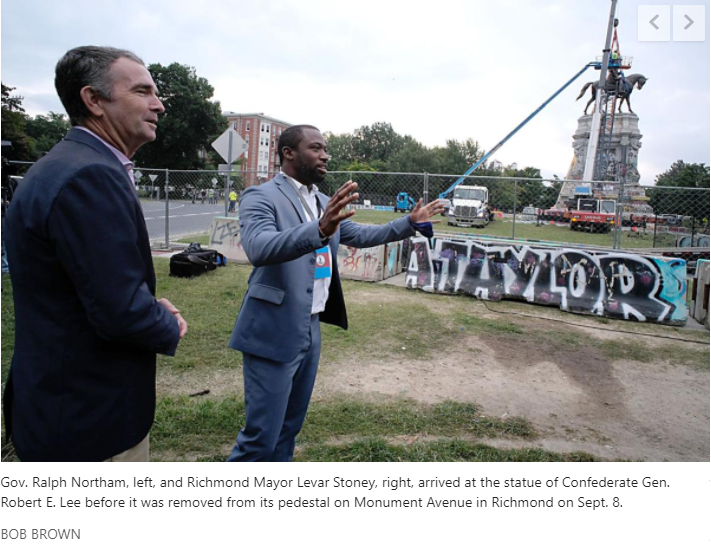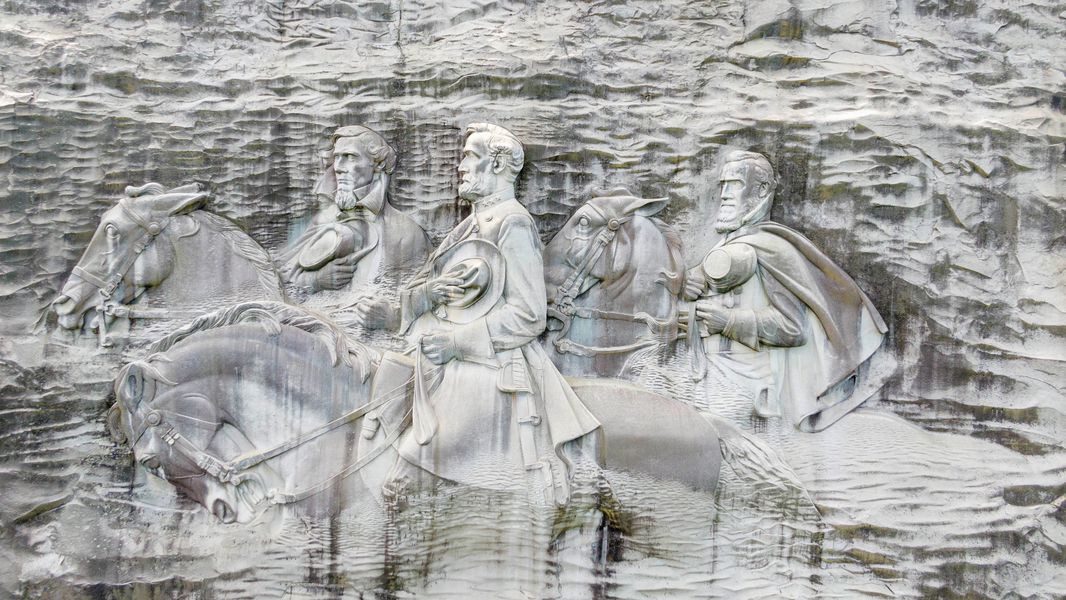The city of Richmond and state officials are planning to give Confederate monuments to the Black History Museum and Cultural Center of Virginia, including the statue of Robert E. Lee and its graffiti-covered plinth.
As part of the transfer, which requires authorization by the Richmond City Council, the Black History Museum will partner with the Valentine and other local cultural organizations to decide what to do with the monuments that were toppled by protesters or removed by the city and state since last year.
State and local officials announced the plan Thursday, nearly 18 months after a wave of protests following the police killing of George Floyd in Minneapolis led Gov. Ralph Northam and Richmond Mayor Levar Stoney to order the removal of the monuments in the former capital of the Confederacy.
“Symbols matter, and for too long, Virginia’s most prominent symbols celebrated our country’s tragic division and the side that fought to keep alive the institution of slavery by any means possible,” Northam said in a news release. “Now it will be up to our thoughtful museums, informed by the people of Virginia, to determine the future of these artifacts, including the base of the Lee Monument which has taken on special significance as protest art.”
Officials said they reached the transfer decision after concluding that it would be best to let local museums determine how the monuments should be interpreted. A city news release says officials think it will also generate “philanthropic support” and streamline the public engagement process.
“Entrusting the future of these monuments and pedestals to two of our most respected institutions is the right thing to do,” Stoney said.
“They will take the time that is necessary to properly engage the public and ensure the thoughtful future uses of these artifacts, while we reimagine Monument Avenue, focus on telling our history fully and accurately in places like Shockoe Bottom and lift up residents throughout the city.”
Richmond originally received about two dozen requests for its Confederate monuments in 2020 from museums, preservation groups and cultural organizations. The Black History Museum was not among them.
Still, four of the city’s nine council members — Katherine Jordan, Kristen Larson, Stephanie Lynch and Michael Jones — said Thursday that they are open to the plan.
Eighth District Councilwoman Reva Trammell said she is largely concerned with other matters, but did not indicate she would vote against the plan. The other four council members could not be immediately reached for comment.
Marland Buckner, interim executive director of the Black History Museum, which was founded in 1981 and opened to the public in 1991, said the organization is looking forward to engaging the public about what should be done with the monuments.
“Our institution takes very seriously the responsibility to manage these objects in ways that ensure their origins and purpose are never forgotten: that is the glorification of those who led the fight to enslave African Americans and destroy the Union,” Buckner said. “We believe with this responsibility also comes opportunity — opportunities to deepen our understanding of an essential element of the American story: the expansion of freedom.
“We hope this process will elevate public dialogue about our shared history and in so doing encourage and invite more citizens into fact-based, respectful conversations about the profound challenges we face as a nation.”
While the City Council was expected to manage the disposition of the monuments, the process largely stalled before the council requested help from the mayor’s administration to reach a decision.
Jordan said she is particularly supportive of the idea because it will free up city staff to focus on other priorities. “During [the COVID-19 pandemic], there really hasn’t been a good opportunity for people to focus on this,” the 2nd District councilwoman said.
Larson, who represents the 4th District, said she’s also open to transfer the monuments to the Black History Museum, but has misgivings about how council members were not informed of the plan until Wednesday evening.
“I don’t think we’ve received a public update in a while. I had received some updates that they were continuing to work on it, but I didn’t know,” she said. “It’s just not transparent.”
While the plan does not include the monument of A.P. Hill that’s still standing at the intersection of Laburnum Avenue and Hermitage Road, the city will accept the 12-ton tribute to Lee and its 40-foot pedestal before transferring it to the museum.
City officials said they will not transfer the Hill monument as discussions with his descendants about the monument and buried remains of the Confederate officer underneath it are still ongoing.
As the state needed another year to resolve litigation challenging Northam’s removal order for the state-owned Lee monument, the governor only recently revealed plans to transfer control of the monument to the city, about three months after the statue was removed from the pedestal.
Stoney spokesman Jim Nolan said the city is also preparing to remove the remaining monument pedestals throughout the city, and that they will be included in the transfer. He said the artifacts recently recovered from two time capsules in the Lee monument pedestal and any others found in the other monuments will also be part of the deal, but that the Department of Historic Resources will analyze them first.
Chelsea Higgs Wise, a local grassroots activist and host of the podcast Race Capitol, said in an interview Thursday that she worries the process could drag on for too long. She noted that the Charlottesville City Council recently approved plans to give its own statue of Lee to a museum that plans to melt it down and create new public art.
“Maybe we don’t need more conversations around these monuments,” she said. “A lot of people did a lot of work to get them out of sight and out of mind. And it seems like we could make decisions more geared around like what Charlottesville did.”
The Charlottesville decision has been controversial, however, with a lawsuit filed challenging the order. On the other hand, Albemarle County officials met complaints from area residents last year when they gave the county’s statue of a Confederate soldier to a battlefields foundation in the Shenandoah Valley.
Northam and Stoney ordered monuments taken down last year, just weeks before a newly amended state war memorial law allowing their removal was slated to go in effect on July 1, 2020.
The law was changed after years of debate about Confederate iconography and memorials in public spaces. Republicans largely defended them, while Democrats, who gained majority control of the General Assembly in 2019, sought to allow their removal.
A Northam aide said earlier this month that it was important to the Democratic governor to see the land transferred to the city before he left office. Republican Glenn Youngkin will be inaugurated as governor on Jan. 15.
–-richmond.com



